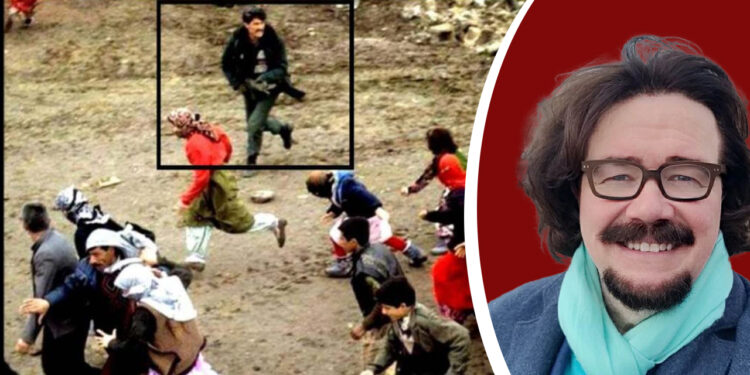Dr. Thoreau Redcrow exposes Turkey’s manipulation of truth regarding the Kurdish resistance movement, particularly the PKK, in a recent article for The Kurdish Center for Studies. He challenges the narrative of 40,000 deaths attributed to the PKK, revealing discrepancies and highlighting Turkey’s role in civilian casualties. Redcrow criticises the media’s failure to acknowledge Kurdish victims and calls for a nuanced understanding of the conflict.

Turkey has manipulated and distorted the truth surrounding the Kurdish resistance movement, particularly regarding the Kurdistan Workers’ Party (PKK), in the context of its conflict with the Turkish state, American global conflict analyst Dr. Thoreau Redcrow has said in an article for The Kurdish Center for Studies.
In this illuminating article, Redcrow highlights the pervasive narrative propagated by Turkish state media, which repeatedly attributes a death toll of 40,000 to the PKK, framing them as the primary perpetrators of violence. “However, when you investigate the reality behind this number, such as where it came from, who it refers to, and who is culpable, you realize that the truth has been flipped upside down,” Redcrow says.
Drawing on historical and contemporary examples, Redcrow illustrates how the Turkish state employs propaganda and censorship to maintain its narrative of the PKK as a terrorist organisation responsible for civilian deaths. He examines discrepancies in reported casualty figures, highlighting instances where Turkish forces have been responsible for the majority of deaths but have attributed them to the PKK.
Focusing on Turkey’s blocking of a truth commission, he states, “Any truth commission would unearth all the ways that the Turkish military, secret police, and death squads murdered thousands of Kurds while also burning down over 4,000 Kurdish villages throughout the 1990s.”
Taking issue with how most articles by Turkish and indeed Western media involving the PKK include a reference to the “40,000” people killed by the conflict, Redcrow points out that “the fact that most of the deaths were Kurds is not mentioned”, nor is the fact that the killer in the vast majority of those cases was Turkey, not the PKK.
Digger deeper into ‘official’ figures from the Turkish state, Redcrow reveals how the previous figure of 30,000 that was distributed in 1999 only included 5,238 deaths of military personnel considered to be killed by the PKK. That total figure became 40,000 in 2005.
“When the PKK are mentioned, the impression is always given that they are responsible for killing the 40,000 themselves and not being the victims of 75–80% of that casualty count,” the conflict analyst states.
The ‘40,000’ itself comes under scrutiny, as Redcrow points to numerous figures from Turkey which range from 44,042 in 2008 to 35,576 in 2013. It is a ‘miracle’ “that in the five years from 2008 to 2013, 8,466 people were apparently resurrected from the dead,” he says.
The author details numerous occasions where Turkey blamed the PKK for deaths of civilians, before eventually backtracking after investigations found the state responsible instead.
Through referencing speeches made from Nazi Germany, Redcrow highlights the absurdity and moral bankruptcy of attributing civilian deaths to a resistance movement fighting against oppression, accusing Turkey of employing similar rhetoric.
In his conclusion, Redcrow calls for an outright rejection of simplistic narratives that demonise one side while absolving the other of responsibility.
Dr. Thoreau Redcrow’s full article for The Kurdish Center for Studies is available to read here.
Dr. Thoreau Redcrow is an American global conflict analyst who specialises in geopolitics, stateless nations, and armed guerrilla movements. He is a frequent speaker before the United Nations Human Rights Council in Geneva and has been a foreign policy advisor for several groups seeking self-determination. He has previously worked on the ground throughout Europe, Latin America, the Caribbean, Eastern Africa, and the Middle East. He is currently Co-Director of The Kurdish Center for Studies (English branch).








Leave A Comment